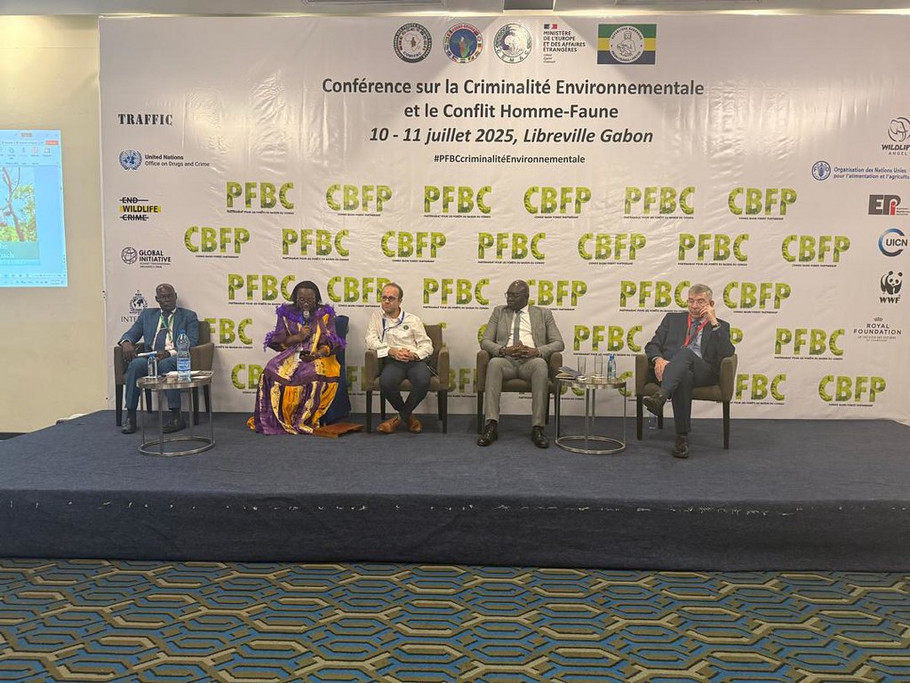
Securing corridors, empowering herders: rethinking transhumance at the regional level
Libreville, 8-9 juillet 2025 – En marge de la réunion du Partenariat pour les Forêts du Bassin du Congo (PFBC), s’est tenu un événement stratégique au cœur des enjeux pastoraux régionaux : le Transhumance Day 2025. Coorganisé par le projet GIZ/PETRADEP et la Facilitation franco-gabonaise du PFBC, en collaboration avec la COMIFAC et la CEEAC, ce side event a rassemblé décideurs, experts, pasteurs et partenaires pour faire le point sur la mise en œuvre de la Déclaration de N’Djamena de 2019.
Un objectif clair : faire avancer la Déclaration de N'Djamena
Cinq ans après son adoption, la Déclaration de N’Djamena reste une feuille de route essentielle pour réguler la transhumance transfrontalière tout en promouvant la paix, la conservation de la biodiversité et le développement local.
Le Transhumance Day visait ainsi à :
- Valoriser les avancées concrètes sur le terrain ;
- Identifier les défis persistants ;
- Proposer des orientations stratégiques innovantes ;
- Préparer le Colloque régional sur le pastoralisme, prévu à N’Djamena du 24 au 26 septembre 2025.
Faits saillants des échanges
Plusieurs points clés ont émergé lors des sessions de travail :
- Une meilleure coordination multi-acteurs est jugée essentielle, notamment entre les États, bailleurs, projets existants et institutions régionales (CEEAC, COMIFAC, IGAD).
- La transition vers l’agro-pastoralisme, couplée à l’usage des technologies (géolocalisation, suivi numérique), est encouragée.
- Les enjeux de sécurité, gouvernance foncière, santé animale et changements climatiques ont été largement débattus.
- Des initiatives réussies comme TANGO Team, PAIRAC ou encore PETRADEP offrent des modèles inspirants à adapter et à amplifier.
Huit orientations stratégiques fortes
Le document de synthèse propose une feuille de route en huit priorités, parmi lesquelles :
- Créer un cadre de coordination régional multi-acteurs sur la transhumance.
- Digitaliser et cartographier les itinéraires pastoraux avec les outils de l’OFAC.
- Intégrer la santé animale dans l’approche One Health.
- Renforcer l’accès des pasteurs aux services essentiels (crédit, vétérinaires, infrastructures).
- Impliquer davantage les femmes, jeunes et communautés locales dans la gouvernance.
- Relier transhumance, politiques climatiques et crédits carbone.
- Promouvoir l’éducation environnementale et les dialogues intercommunautaires.
- Valoriser les modèles et bonnes pratiques existants à travers la sous-région.
Recommandations clés aux parties prenantes
Les recommandations issues de ces deux journées s’adressent aux États membres, bailleurs, ONG, organisations de la société civile, médias communautaires et communautés pastorales. Elles appellent à :
- Une harmonisation légale régionale sur la transhumance ;
- L’aménagement des couloirs pastoraux avec des infrastructures adaptées ;
- La valorisation économique du pastoralisme ;
- L’intégration des outils de traçabilité pour les produits pastoraux ;
- L’implication active des radios pastorales dans la communication, l’alerte précoce et la médiation.
Libreville, July 8–9, 2025 – On the sidelines of the Congo Basin Forest Partnership (CBFP) meeting, a key event brought pastoralism into the spotlight: Transhumance Day 2025. Co-organized by the GIZ/PETRADEP project and the Franco-Gabonese Facilitation of the CBFP, in collaboration with COMIFAC and ECCAS, this side event brought together decision-makers, experts, herders, and partners to assess the implementation of the 2019 N'Djamena Declaration.
A Clear Objective: Advancing the N'Djamena Declaration
Five years after its adoption, the N'Djamena Declaration remains a key roadmap for regulating cross-border transhumance while promoting peace, biodiversity conservation, and local development.
Transhumance Day aimed to:
- Showcase progress made on the ground;
- Identify remaining challenges;
- Propose innovative strategic orientations;
- Prepare for the Regional Pastoralism Symposium, scheduled for N'Djamena from September 24–26, 2025.
Key Takeaways from the Discussions
Several major points emerged from the working sessions:
- Stronger multi-actor coordination was deemed essential, especially among States, donors, existing projects, and regional institutions (ECCAS, COMIFAC, IGAD).
- A shift from pastoralism to agro-pastoralism, combined with the use of technology (geolocation, digital monitoring), is encouraged.
- Issues around security, land governance, animal health, and climate change were widely debated.
- Successful initiatives such as TANGO Team, PAIRAC, and PETRADEP serve as inspiring models to adapt and scale up.
Eight Strategic Directions for Action
The summary document proposes eight key orientations, including:
- Establish a regional multi-actor coordination framework on transhumance.
- Digitalize and map pastoral routes using OFAC tools.
- Integrate animal health into a One Health approach.
- Improve herders’ access to veterinary services, credit, and markets.
- Systematically involve local communities, women, and youth in governance.
- Link transhumance to climate policies and carbon credit projects, recognizing its impact on deforestation and mobility.
- Promote environmental education and intercultural dialogue through local media.
- Capitalize on successful field models to inspire national action plans.
Key Recommendations to Stakeholders
Recommendations from the event are addressed to member states, donors, NGOs, civil society organizations, media, and pastoral communities. They call for:
- A regional legal review and harmonization of transhumance policies;
- Development of pastoral corridors with water points, markets, and rest areas;
- Economic empowerment of herders through value chain development;
- Integration of traceability tools for pastoral product markets;
- A stronger role for local pastoral radios in communication and conflict mediation.
A Renewed Commitment for 2025 and Beyond
Transhumance Day 2025 marks a turning point: a renewed regional commitment to a secure, productive, and sustainable form of transhumance, in a context of mounting pressure from climate change, land use conflicts, and insecurity. Outcomes from this event will directly feed into the upcoming N’Djamena Symposium in September 2025, a key step toward translating regional ambitions into concrete action on the ground.
Un plaidoyer renouvelé pour 2025 et au-delà
Le Transhumance Day 2025 a marqué un tournant : celui d’un engagement régional renforcé en faveur d’une transhumance sécurisée, productive et durable, dans un contexte de pressions multiples (changements climatiques, conflits d’usage, instabilité sécuritaire). Les résultats de cette rencontre viendront nourrir les discussions du Colloque de N’Djamena en septembre 2025, étape déterminante pour traduire les ambitions régionales en actions concrètes sur le terrain.
Share: